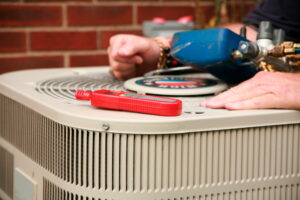The fall season is in full swing, but you’re not quite done with your air conditioner yet. Even though temperatures are cooling down and you have probably already switched your thermostat over to heat, your AC still needs some attention before you turn it off until spring.
Investing in air conditioning repair in Boulder now is the best way to ensure that your air conditioner is ready to cool your home again next summer. You can keep reading to learn more about common late-season AC repairs that we see in the signs of each one.
Capacitor Problems
Your air conditioner has two different capacitors, and either one of them can have problems. The first capacitor is the start capacitor, and as the name implies it helps your air conditioner to start up for a cooling cycle. The second capacitor is the run capacitor, and it takes over after a cooling cycle begins to maintain the cooling cycle until it is complete.
If you have problems with the start capacitor, your air conditioner may make loud noises or struggle to turn on for a cooling cycle. If you have issues with the run capacitor, your AC may not stay on like it should to complete a cooling cycle all the way through.
Blower Motor
We also get a fair amount of calls about problems with blower motors inside of air conditioners. If your blower motor is struggling to operate, you may hear a grinding sound due to a lack of lubrication. However, if the blower is off balance you may hear more of a thumping sound as the motor works. Either way, time is of the essence when it comes to addressing these issues. If you can take care of them sooner rather than later, you can make repairs instead of needing to replace the blower motor completely.
Frozen Coils
Your air conditioner may face some hiccups here and there after working hard to cool your home the entire summer season. Blockages that prevent airflow and refrigerant leaks can lead to ice developing on the evaporator coils.
What starts out as a little bit of ice can quickly develop into a thick layer of ice that further blocks your air conditioner from cooling your home effectively. Ice is not a sign that your air conditioner is cooling well but instead signals the opposite. It needs to be thawed out and the source of the problem fixed so it doesn’t happen again in the future.
Lack of Airflow
We already mentioned that poor airflow can cause frozen evaporator coils, but it can lead to other problems, too. Without adequate airflow leading into your air conditioner, there’s not enough air to cool and blow out into your home.
Your home may not reach your desired temperature and as a result, your air conditioner works harder to produce the results you want. This strain can cause problems inside your AC and lead to components wearing out and needing to be repaired or replaced.
Contact Meyers Heating & Air Conditioning today to schedule an appointment for air conditioning repair with our professionals.


